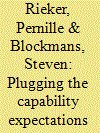| Srl | Item |
| 1 |
ID:
174845


|
|
|
|
|
| Summary/Abstract |
Forced migrants and refugees are affected by the COVID-19 pandemic in different and often more profound ways than local populations. This article examines the multilayered vulnerabilities these groups face due to forced immobility, precarious legal status, loss of income, and risks of eviction due to lockdown measures, as well as forced return migration. It discusses the public health and socioeconomic implications of each of these contexts, providing examples from different world regions, with a focus on South America. A key conclusion is the importance of providing regularization mechanisms for migrants, as well as including migrant and refugee populations in states’ emergency responses.
|
|
|
|
|
|
|
|
|
|
|
|
|
|
|
|
| 2 |
ID:
164650


|
|
|
|
|
| Summary/Abstract |
Since the entry into force of the Lisbon Treaty in 2009, the European Union (EU) has spent considerable time and energy on defining and refining its comprehensive approach to external conflicts. The knock-on effects of new and protracted crises, from the war in Ukraine to the multi-faceted armed conflicts in the Sahel and the wider Middle East, have made the improvement of external crisis-response capacities a top priority. But has the EU managed to plug the capability–expectations gap, and develop an effective, comprehensive and conflict sensitive crisis-response capability? Drawing on institutional theory and an approach developed by March and Olsen, this article analyses whether the EU has the administrative capacities needed in order to be an effective actor in this area and implement a policy in line with the established goals and objectives identified in its comprehensive approach.
|
|
|
|
|
|
|
|
|
|
|
|
|
|
|
|
| 3 |
ID:
182531


|
|
|
|
|
| Summary/Abstract |
In the aftermath of the global COVID-19 crisis, whereas many world leaders enacted swift lockdown orders and robust testing regimes to preserve public health and to speed up economic recovery, Donald Trump in the United States and Jair Bolsonaro in Brazil responded to outbreaks by publicly downplaying the significance of the crisis and argued that overly restrictive health measures would create too sizable an economic risk. These two presidents have done much to weaken democracy and trust in government. In this article, we examine the extent to which two institutions in each country––federalism and the party system––impacted the ways in which they framed the COVID-19 crisis and policy responses to it in 2020, especially during the first months of the pandemic. Our evidence suggests that each of these institutions provided opportunities for both leaders to reconstruct public understandings of the crisis while deflecting blame for negative public-health outcomes.
|
|
|
|
|
|
|
|
|
|
|
|
|
|
|
|